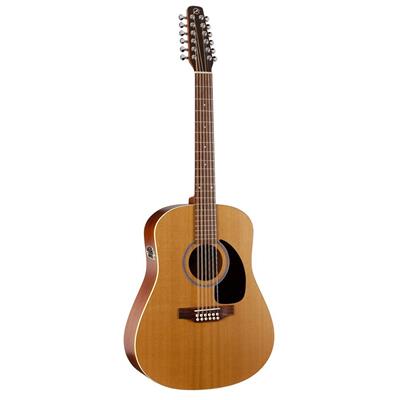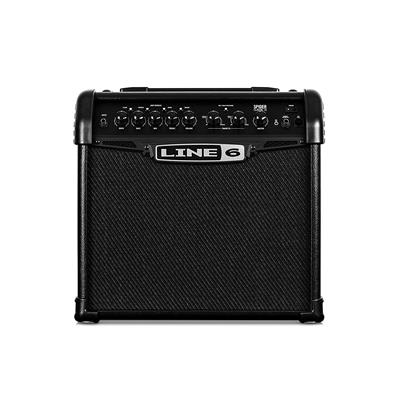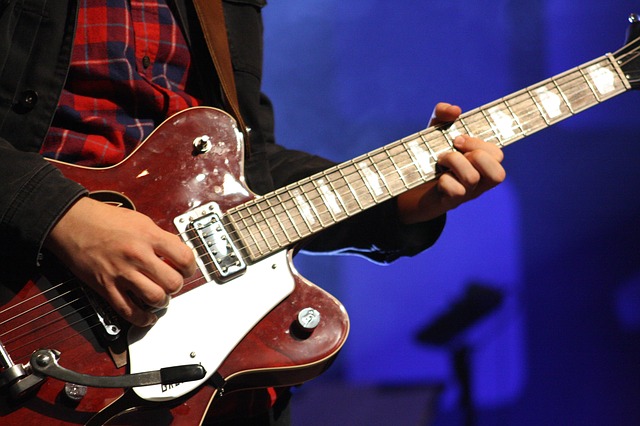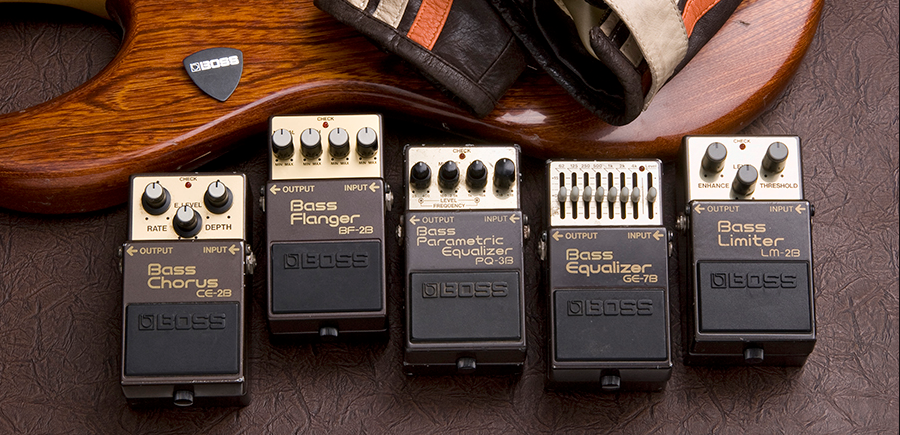 We all know that bass is the instrument that plays its own game and sets its own rules. It sounds mesmerizing with or without audio effects and can truly make a difference when added to the mix. If you are a professional bassist, you might want to stick to traditional ways and reprimand the effects. However, if you choose to be more open-minded, you might receive mind-blowing results.
We all know that bass is the instrument that plays its own game and sets its own rules. It sounds mesmerizing with or without audio effects and can truly make a difference when added to the mix. If you are a professional bassist, you might want to stick to traditional ways and reprimand the effects. However, if you choose to be more open-minded, you might receive mind-blowing results.
Bass effects are an easy way to add more presence to your signal, let it cut through the mix or create powerful solos. They even open up the doors of creativity and give you an array of sonic possibilities. Choosing the best bass pedal might be a difficult and overwhelming process, but with the little help, you will manage it in no time. This article will discuss different effects pedals for bass and outline the basic know-how of each of them. After knowing what is what, picking out the best suitable pedal for your bass will be a matter of seconds.
No Bass Pedal Yet?
Best Bass Distortion Pedals

Have you ever wondered, what would happen if bass and distortion met? If so, I have an answer for you: the thickest, the most unworldly sound would be created. There are many ways of achieving this effect, but the simplest one is by plugging in a bass distortion pedal. Why not use an ordinary dist box, you might ask? Well, as with any device out there, the key to perfection lies in details. Bass distortion is no exception. In order to create the desired effect, you need a unit that can discern your signal to say the least. Due to the specific nature of bass, not every pedal can handle its frequencies. That is why you will get better results if you spend a coin on a bass distortion pedal. This fella will saturate your sound with just the right amount of girth and gain, affect the proper frequencies and showcase all the different dimensions of your sound. Generally, such kind of pedal comes with Gain, Volume, Blend and some sort of EQ features. If you are looking for the best bass effects pedal, you have to try a bass distortion.
Best Bass Overdrive Pedals
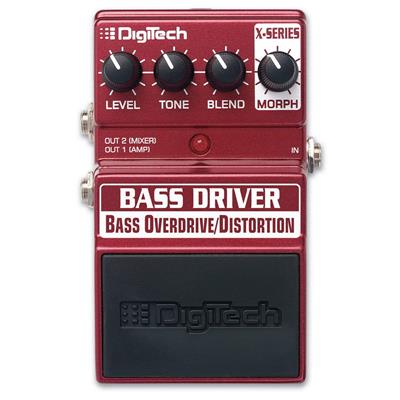
Since overdrive is a subtler brother of distortion, it gets along with bass like a house on fire. This unit knows how to add distortion to your sound without making it too muddy and depriving it off definition. It can produce anything from warm, tube overdrive to crazy fuzzy-like sounds. It all depends on the settings you choose. Some bass overdrive pedals even offer different modes so that you can easily switch between the diverse characters of this effect. Typically, the pedals of this ilk come with four main knobs: Volume (a.k.a. Level), Gain, EQ (a.k.a. Tone) and Blend. Each of them manages the given parameters and makes sure that you have full control over your tone. A bass overdrive pedal will fill any hole you have on your pedal board and make your sound really stand out. In my book, this is the effect that accentuates the very nature of bass. For all those adventurous players out there, this is your chance to shine!
Best Bass Compressor Pedals
 If you play on a professional level, you know that a compressor is a god-sent treat. Getting the right sound can be a pain in the neck and this unit turns this frustrating process into an enjoyable one. To put it simply, it tones down any spiky tones in your sound and makes sure that your sound is even. Alternatively, it amplifies the overly quiet notes and makes them audible. A compressor pedal is basically a studio-quality sound adjustment in the form of a stompbox. All of this is especially beneficial for bass players. This instrument, though amazing and unique, can be a bit hard to control. If you are having an issue of producing the perfect sound, the bass compressor pedal will be your best friend. What is more, sometimes a bad acoustics of the venue or other unpredictable events can jeopardize your sound and interfere with the audibility of different frequencies. A bass compressor will help you avoid such kind of undesirable turn of events. Typically, the pedals of this sort are equipped with Level, Sustain, Attack and Release knobs. Some of them might even come with EQ or Blend knobs. If you want to take your performance to a whole new level, get yourself a bass compressor pedal.
If you play on a professional level, you know that a compressor is a god-sent treat. Getting the right sound can be a pain in the neck and this unit turns this frustrating process into an enjoyable one. To put it simply, it tones down any spiky tones in your sound and makes sure that your sound is even. Alternatively, it amplifies the overly quiet notes and makes them audible. A compressor pedal is basically a studio-quality sound adjustment in the form of a stompbox. All of this is especially beneficial for bass players. This instrument, though amazing and unique, can be a bit hard to control. If you are having an issue of producing the perfect sound, the bass compressor pedal will be your best friend. What is more, sometimes a bad acoustics of the venue or other unpredictable events can jeopardize your sound and interfere with the audibility of different frequencies. A bass compressor will help you avoid such kind of undesirable turn of events. Typically, the pedals of this sort are equipped with Level, Sustain, Attack and Release knobs. Some of them might even come with EQ or Blend knobs. If you want to take your performance to a whole new level, get yourself a bass compressor pedal.
Best Bass Chorus Pedals

If you are looking for ways to change your bass sound a bit and crank it up a notch, you might want to try a bass chorus pedal. This is probably the most unusual combination of all, however, it works perfectly. As with any typical pedal that can produce this effect, a bass chorus adds a touch of shimmer to your sound. The only difference is that such kind of unit is specifically designed to affect the lower end of the frequency spectrum and emphasize its character of it. This sort of unit, generally, comes with Speed (a.k.a. Rate), Level (a.k.a. Volume), Bass and Treble control. These features balance out different parameters of your sound and allow you to tailor tones to your preferences. This is particularly significant since neither bass nor chorus is easy to master. A bass chorus pedal will add sweetness, warmth and vintage vibes to your gnarly bass sounds. If I were you, I would not waste any more time and would grab this unit right away.
Best Bass Fuzz Pedals
 As with any other bass pedal, the very first thing you should look out for when choosing a bass fuzz is its frequency range. Typically, the effects pedals designed for electric guitar tend to filter out low-end while accentuating the high-end. Obviously, if that happens to the bass signal, nothing will be left of its character and nature. There are four main features that will assist you in creating the perfect fuzz sounds: Level, Gain (may also be labeled as Fuzz or Drive) and some sort of tone-shaping options, such as Treble and Bass, or Blend. That is all you will need to add that badass distortion to your gnarly bass. Do not get overboard, though. Fuzz can muddy up any sort of sound, imagine what its overdose will do to the bass signal. Start slowly and add more gently until you find those perfect settings. Other than that, you will be fine. The majority of the bass fuzz pedals out there are quite easy to nail and require only a few tweaks.
As with any other bass pedal, the very first thing you should look out for when choosing a bass fuzz is its frequency range. Typically, the effects pedals designed for electric guitar tend to filter out low-end while accentuating the high-end. Obviously, if that happens to the bass signal, nothing will be left of its character and nature. There are four main features that will assist you in creating the perfect fuzz sounds: Level, Gain (may also be labeled as Fuzz or Drive) and some sort of tone-shaping options, such as Treble and Bass, or Blend. That is all you will need to add that badass distortion to your gnarly bass. Do not get overboard, though. Fuzz can muddy up any sort of sound, imagine what its overdose will do to the bass signal. Start slowly and add more gently until you find those perfect settings. Other than that, you will be fine. The majority of the bass fuzz pedals out there are quite easy to nail and require only a few tweaks.
Best Bass Octave Pedals
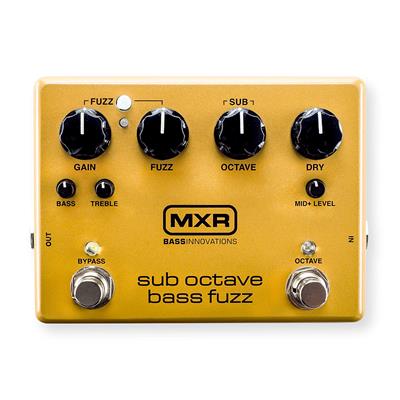 If you have ever dealt with an octave pedal before, you probably already know what the deal is about. The key feature here is clarity. When using an octave effect, you do not want your sound to be distorted. All you want to get is the tone that is an octave higher or lower than the original signal. The bass octave pedal shares the same specifics as the guitar ones, the only difference being the bass dedicated circuitry. Due to this reason, units of this ilk are quite easy to control. They come with several knobs: Level and Octave up or down. Some might offer tone-shaping options, as well as additional features. One way or another, bass octave pedals are easy to handle and give you the desired results no matter what. Typically, bassists go for one octave up or down, because otherwise they will lose the bass sounds. However, how you will utilize your pedal is completely up to you and depends on your preferences and music style.
If you have ever dealt with an octave pedal before, you probably already know what the deal is about. The key feature here is clarity. When using an octave effect, you do not want your sound to be distorted. All you want to get is the tone that is an octave higher or lower than the original signal. The bass octave pedal shares the same specifics as the guitar ones, the only difference being the bass dedicated circuitry. Due to this reason, units of this ilk are quite easy to control. They come with several knobs: Level and Octave up or down. Some might offer tone-shaping options, as well as additional features. One way or another, bass octave pedals are easy to handle and give you the desired results no matter what. Typically, bassists go for one octave up or down, because otherwise they will lose the bass sounds. However, how you will utilize your pedal is completely up to you and depends on your preferences and music style.
Effects with bass? Are you serious?
Yes, indeed, my friend, yes indeed. Bass is the instrument that has always been “bullied” by guitarists. You know how the electric guitar solos have so much color and dimension, how they shine and stand out? Well, bassists are rarely allowed to step out of their niche position and go crazy with the instrument. In most cases, their role is limited to maintaining the bottom-end and keeping a certain rhythm. That is why effects are not that typical for bass. However, times change, and coloring the bass with different effects is getting more and more common. The music industry has been kind enough to provide us with an abundance of bass dedicated effects pedals. The only thing left is to get experimental and adventurous, daring enough to kick your sound up a notch. There is nothing to be afraid of, your bass craftsmanship deserves to be amplified and accentuated with the use of audio effects. After all, bassists want to create something different, too. You just have to know how to set everything perfectly. I will give you some tips so that you have a general idea how each effect interacts with one another.
How to set up a bass effects chain?
Let’s start with a little disclaimer here: the recommendations I am about to provide are not clear-cut rules that you should obey. You are free to design your setup the way your heart desires. These are just some suggestions that will help you understand the basics and the things that have worked in the past. So, there are a lot of variations when it comes to signal chain orders but typically they all follow one general “diagram”: tuners à filters à compressors à distortion and overdrives à EQ à pitch shifters à modulation effects à volume pedals à reverb/echo/delay. Such kind of setup works perfectly because each pedal complements one another rather than overlapping and ruining. To put it more simply, if you place a distortion pedal in the beginning of your chain, every effect you activate will be added to the affected signal, not the pristine one. This means it will not have enough definition and the different colors of the effects will get mixed up. You want to layer them on top of each other. All of this is particularly important in terms of bass guitar since it has a specific sound on its own. Everything you do with your setup should emphasize that character and define it even more.
The best bass effect?
It is almost impossible to come up with the answer to this question. We are all different and have our own musical preferences. These preferences largely define the way we perceive our performance and the things we create. This is why it is utterly hard to single out the one that works the best. I would say that the best bass effect is the one that suits your needs the most, adds a unique touch to your music and brings everything together. The key to finding your soulmate of bass pedals is experimenting with a lot of units. Once you hear the sound that soothes your ears and makes you heart skip a bit from excitement, you will know you have found the best effect for your bass. Do not get intimidated by anything and let your bass dictate the path you shall take.
Conclusion
To conclude everything said above, the bass is quite a picky instrument. You have to fuss with it, be advertent and careful so that you do not miss out any details. Mastering the bass takes years of practice, blood, sweat and tears. However, once you do nail this instrument, nothing will stand in your way to perfect sounds. My quest today was to help you on that journey and give you some advice on enhancing your possibilities. The effects that I have listed above are the ones that work wonders when combined with bass. They amplify every single bit of bass sounds, make them stronger, louder and more powerful. No matter what technique you use or the genre you play, finding the best bass effects is the key to taking your sound to a whole new level. Performance is not an easy job and there are a lot of things that could go wrong. Why not extenuate everything and avoid unnecessary headache? Whether you choose to employ bass effects is completely up to you, but if you do, trust me my friend, there will be no going back. One way or another, you have a wonderful journey ahead of you. Good luck!

